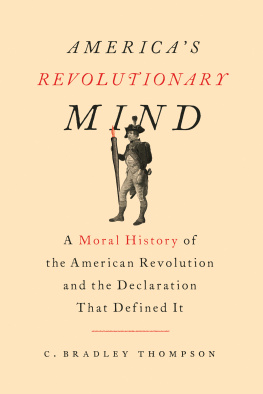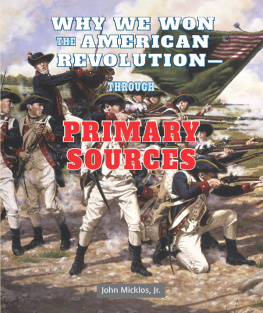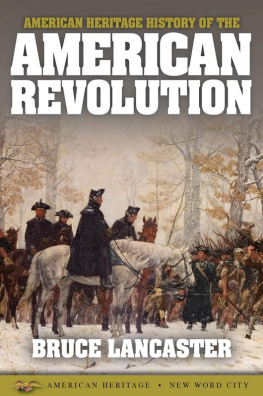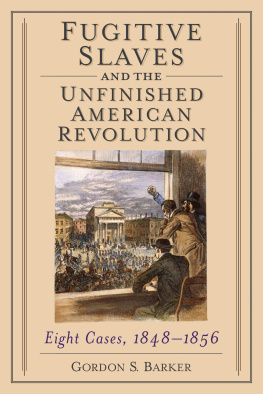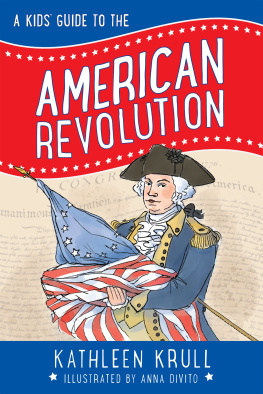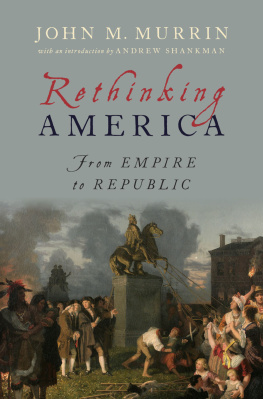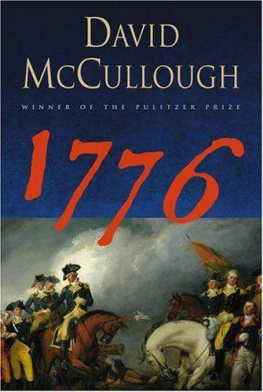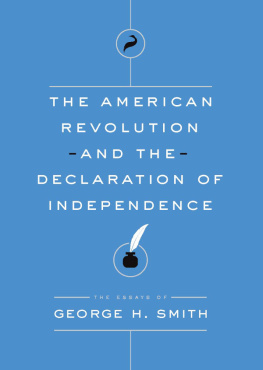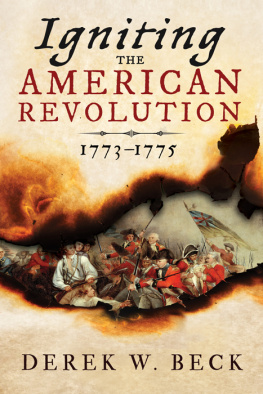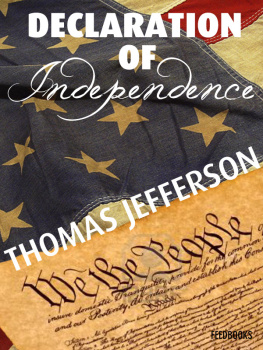
Praise for Americas Revolutionary Mind
Americas Revolutionary Mind is a tour de force that vastly expands our understanding of the ideas that launched the American Revolution. Thompson goes beyond the groundbreaking intellectual histories by Bernard Bailyn and Gordon Wood by explaining how Americans came to embrace Enlightenment ideas about human nature, reason, and moral principles in the years preceding 1776. For legal and constitutional scholars, this monograph will become an essential source on the original meaning of fundamental political and legal concepts in the founding era, especially when combined with his forthcoming companion book on the Constitution.
Adam Mossoff, Professor of Law, Antonin Scalia Law School, George Mason University
Thompsons stunning new interpretation of the American Revolution restores the Declaration of Independence as the clearest window into Americans thoughts regarding their rightful relationship with Great Britainas well as with each other. Cogent and compelling, his careful analysis of the ideas and events leading to independence amounts to the best intellectual history of the Revolution in years.
Robert M. S. McDonald, United States Military Academy, author of Confounding Father: Thomas Jeffersons Image in His Own Time
Americas Revolutionary Mind says new things about and takes new approaches to the world of ideas in the era of the American Revolution. Since his John Adams and the Spirit of Liberty, C. Bradley Thompson has continued to enlighten us and to challenge conventional wisdom. By using moral philosophy as his books foundation, Thompson changes our angle of vision on the subject: the Revolution looks different when we adopt his perspective. Beautifully written and formidably documented, his book confronts such predecessors as Bernard Bailyn, Gordon Wood, Henry Steele Commager, and Douglass Adair. Readers who disagree with his argument in whole or in part, particularly with his account of the relationship between the Revolutions intellectual world and the history of American thought up to our time, must read him nonetheless. This is an essential book.
R. B. Bernstein, City College of New York, author of The Education of John Adams and Are We to Be a Nation?: The Making of the Constitution
Those who believe there is nothing new to say about the American Revolution are in for a great surprise. C. Bradley Thompson shows that an unprecedented change in the method of thinking in the decade preceding Lexington and Concord was the deepest cause of the shot heard round the world.Before it unfolded on the battlefield, the real Revolution was born first in the minds of Americas leaders and the public. Thompsons unerring mastery of this period provides us with an education, as important today as it was 250 years ago, into this nations fundamental principles.
James Ceaser, Professor of Politics, University of Virginia
With Americas Revolutionary Mind, C. Bradley Thompson launches a new moral history, an approach to understanding our past and ourselves that puts front and center the American founders claim to have grasped and to have acted on the basis of an objective moral reality. Thompsons book, at its heart, challenges us to see the American Revolution as rooted in a moral choice for freedom over slavery, a choice that faces each generation, and, indeed, each one of us.
Bradford P. Wilson, Executive Director of the James Madison Program and Lecturer in Politics, Princeton University
AMERICAS
REVOLUTIONARY
MIND
AMERICAS
REVOLUTIONARY
MIND

A Moral History of the American Revolution and the Declaration That Defined It

C . BRADLEY THOMPSON

2019 by C. Bradley Thompson
All rights reserved. No part of this publication may be reproduced, stored in a retrieval system, or transmitted, in any form or by any means, electronic, mechanical, photocopying, recording, or otherwise, without the prior written permission of Encounter Books, 900 Broadway, Suite 601, New York, New York, 10003.
First American edition published in 2019 by Encounter Books, an activity of Encounter for Culture and Education, Inc., a nonprofit, tax exempt corporation.
Encounter Books website address: www.encounterbooks.com
Manufactured in the United States and printed on acid-free paper. The paper used in this publication meets the minimum requirements of ANSI/NISO Z39.481992
(R 1997) (Permanence of Paper).
FIRST AMERICAN EDITION
LIBRARY OF CONGRESS CATALOGING-IN-PUBLICATION DATA
Names: Thompson, C. Bradley, author.
Title: Americas revolutionary mind : a moral history of the American Revolution and the Declaration that defined it / by C. Bradley Thompson.
Description: New York : Encounter Books, 2019. | Includes bibliographica references and index.
Identifiers: LCCN 2019014130 (print) | LCCN 2019981311 (ebook) | ISBN 9781641770668 (hardcover : alk. paper) | ISBN 9781641770675 (ebook)
Subjects: LCSH: Political scienceUnited StatesHistory18th century. | United States. Declaration of Independence. | United StatesHistoryRevolution, 17751783Moral and ethical aspects.
Classification: LCC JA84.U5 T478 2019 (print) | LCC JA84.U5 (ebook) | DDC 973.3/1dc23
LC record available at https://lccn.loc.gov/2019014130
LC ebook record available at https://lccn.loc.gov/2019981311
To all future students of the American Revolution
CONTENTS
PREFACE
T his is the first of whatI hopewill be a two-volume study of the moral, political, and constitutional principles of Americas Revolutionary and founding periods. The natural sequel to Americas Revolutionary Mind would be Americas Constitutional Mind. The relationship between the current and the proposed volume is virtually identical to the connection that Abraham Lincoln saw between the Declaration of Independence and the Constitution.
In January 1861, Lincoln wrote in an unpublished fragment that the American experiment in self-government had a philosophical cause. The prosperity of the United States (the effect) was due in no small part to the Constitution and the Union, but the Constitution and the Union were just the political and constitutional expressions of a deeper moral principlethe principle of Liberty to all, which in turn was housed in the Declaration of Independence. For Lincoln, there was an intimate and necessary connection between the Declaration and the Constitution. Paraphrasing Proverbs (25:11), Lincoln asserted that the Declarations liberty principle was the word, fitly spoken which has proved an apple of gold to us. The Constitution was the picture of silver that framed the Declaration. Americas two great founding documents are each incomplete without the other. The present volume and its sequel will form a similar kind of relationship.
Although it forms a part of a larger whole, the present work stands on its own two feet. It has its own unity of purpose and a unique history. Readers of Americas Revolutionary Mind may appreciate the story of its genesis. In June 2016, I was actually close to finishing
Next page
